|
Local weekly newspaper coverage of this momentous time was somewhat low key – most being published several days after war was declared and therefore having no need to repeat, in great detail, what by then was old news. Bishop's Stortford's newspaper the Herts & Essex Observer, published Saturday 9 September, carried no banner headline on its front page, instead filling it with the usual fare of business advertisements, auction sale dates and public notices – all of which were far more important to the paper's viability than the announcement of war.
In fact the only reference to the war on its front page, mixed in with the adverts, were several small District notices headlined MOBILISATION OF THE ARMY and two brief war-related news stories. District notices gave details of government appointed individuals in Hertfordshire and Essex responsible for the purchase of horses during the emergency, and coal merchants were advised they must register with the local authority, as should consumers of more than 2 tons of coal and/or coke per year register with their coal merchant. Not announced in the paper but put into force that weekend was a 75% limitation of the previous year's use of coal, gas and electricity for all domestic and small industrial consumers.
Of the two news stories the first, headlined 'Many Cats and Dogs Destroyed', told how the National ARP for Animals Committee had denied any truth in the widespread rumour that [because of the war] it was compulsory to get rid of all domestic animals. The rumours had led to many thousands of pets being taken to animal welfare centres to be destroyed, each of which were now filled with the bodies of these animals. One worry was that the destruction of so many cats might lead to a serious and dangerous increase of vermin. The second story, headlined 'Public and Aircraft Crashes', reported on an Air Ministry notice issuing instructions that '..anyone seeing an aircraft land or crash in open country was to inform the nearest police officer or police station, if possible by telephone'.
The paper’s editorial comment on page 2 was a little more vociferant: 'Britain and France are now engaged in War with Germany, although neither of the two nations has any quarrel with the German people, who it is being freely stated, have no desire for war, and this catastrophic war had come upon the world because of one man's insenate lust for power, coupled with a callous indifference to how he obtains it. We are at war with an enemy who appear to have no moral sense, no regard for international law, nor for ordinary laws of humanity.' It went on 'There has been no flag-wagging.. [by the British public]. The whole nation – one may say the whole Empire – has entered upon this war quietly.. with a calm courage to meet the inevitable, and united as one man, it has set its teeth with a grim and invincible determination to see this thing through, cost what it may..'
Not until page 3 did a relatively small headline announce GREAT BRITAIN AT WAR, underscored by three sub-headings – Mr W Churchill to be First Lord – Post for Mr Eden – Premier sets up War cabinet. There followed a brief account of the previous Sunday's events and the transcript of King George VI's speech broadcast to the Empire later that same day.
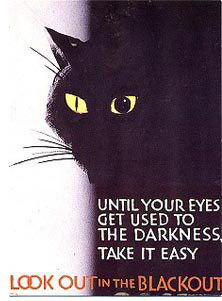 Other reports on the page included *blackout procedures and lighting restrictions, plus advice on sheltering during air raids – 'Anyone who has an Anderson shelter properly earthed over is virtually secure from anything except a direct hit, or the equivalent.' What the 'equivalent' to a direct hit might have been is anybody's guess. Other reports on the page included *blackout procedures and lighting restrictions, plus advice on sheltering during air raids – 'Anyone who has an Anderson shelter properly earthed over is virtually secure from anything except a direct hit, or the equivalent.' What the 'equivalent' to a direct hit might have been is anybody's guess.
*Blackout came into force for the first time at 7.45pm on 1 September. All street lighting was turned off and all motor vehicles were forbidden to use their headlights – two factors that would lead to a dramatic increase in road deaths throughout the war. No chink of light was to be visible from outside any house, flat, shop, office or factory. To aid blackout regulations, Sunday evening church services were to be held in the afternoon – as had happened on the Sunday war was declared.
Other precautionary measures put in place by the government after Germany’s invasion of Czechoslavakia included the passing of the Military Training Act in May, making it compulsory for all men aged 20 – 22 to be called up for 6 months military training – the first ever conscription in Britain in peacetime. And in June the Womens Land Army was formed to help farmers produce more food, the same month that certain elite groups of civilians were evacuated far away from danger zones. Evacuation for the vast majority however, code named Operation Pied Piper, began on 1 September.
This was the dispatch from major cities, by train and by road, of 'priority' class citizens to the relative safety of rural towns and villages in designated areas. The vast majority of evacuees were school children but also included mothers and young children, pregnant women, disabled persons, teachers and other helpers. The government had in fact planned for 3.5 million people to be evacuated in the first three days, but only 1.5 million turned up. Among them 70,000 school children – travelling in 75 special trains – passed through Bishop's Stortford station en route to towns and villages in the *East Anglia region.
*Up until December 1939 the East Anglia region, comprising Bedfordshire, Cambridgeshire, Essex, Hertfordshire, Huntingdonshire, the Isle of Ely, Norfolk and Suffolk, received 163,800 evacuees, of which 137,000 were children. This was the largest total for any region in England. Nationwide, approximately 3.5 million people were evacuated in 1939/40
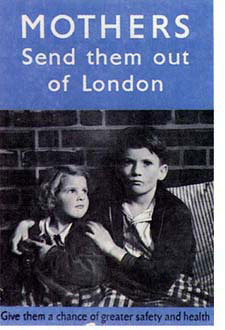 But despite long-term planning the evacuation was often disorganised; many groups gathered at stations put on the first available train regardless of destination. Further confusion once the destination was reached led to many school and family groups being separated and some reception areas being overwhelmed with evacuees they hadn't expected. Whether or not evacuees overwhelmed Bishop's Stortford's reception area at Maze Green Road is unknown, but in December that year Bishop's Stortford Urban District Council (BSUDC) did endorse a protest to the 'higher authorities' against a proposal that meant the town would have to provide billets for even more people. But despite long-term planning the evacuation was often disorganised; many groups gathered at stations put on the first available train regardless of destination. Further confusion once the destination was reached led to many school and family groups being separated and some reception areas being overwhelmed with evacuees they hadn't expected. Whether or not evacuees overwhelmed Bishop's Stortford's reception area at Maze Green Road is unknown, but in December that year Bishop's Stortford Urban District Council (BSUDC) did endorse a protest to the 'higher authorities' against a proposal that meant the town would have to provide billets for even more people.
Householders who took in *evacuees were paid 8s. 6d. (42 1/2p) per week per child by the government, but these temporary 'foster parents' soon complained when they found they were also expected to clothe the children and feed their visiting parents at weekends. Both problems were addressed on 28 October: the Minister of Health confirming that parents, according to their means, should pay at least 6 shillings a week (30p) for the maintenance of each child under 16. Stortford's evacuation committee took over the Corn Exchange from 10 am until 4 pm at weekends where parents could meet their children. A nominal charge was made for refreshment.
*A small percentage of evacuees that came from the slums of London, Liverpool, Birmingham, Manchester and Glasgow, were viewed by some interlectuals as problem families and underprivileged. Indeed, many children were verminous and some had never worn underclothing or eaten a meal from a table. The irony was that many of the same 'interlectually aware', were now being asked to accommodate them. There was in fact a certain amount of anger directed towards some evacuees for what was seen as their shortcomings, and also a great searching of consciences as to how this could be in one of the wealthiest countries on earth.
The Government also paid householders for billeting soldiers: 6d per night for bed and attendance but without provision of meals or cooking facilities. With meals the payment was 10d per night for the first soldier then 8d per night for additional soldiers. Other prices per soldier were: breakfast 8d, dinner 11d, tea 3d, supper 5d.
*As a guide to the above prices, 12d (one shilling) is equivalent to 5p
The greatest difficulty for any householder was sharing their home with strangers, and in many cases the mixing of ‘classes’ was a recipe for disaster – as was two women sharing the same kitchen. Soldiers had no option with the arrangements, but countless women and children evacuees returned to their city homes within days of arrival. School children who remained in Stortford attended any one of the town's eight schools at that time – Northgate End, The Herts & Essex High School for Girls, St Mary's/St Joseph’s, Chantry Mount, Hockerill Boys School, Hockerill Girls and Infants school, Waterside and St Michael's. However, a shortage of teachers and classrooms meant that in some cases local children were taught in the mornings and evacuee children in the afternoons.
16th September: all petrol rationed
17 September: Russian army invades Poland
After just fifteen days, the cause for which Britain and France declared war on Germany was lost. Poland collapsed under the might of Germany and Russia and was in the process of being partitioned.
29 September: On this day the issue and carrying of personal identity cards became compulsory – blue for adults, brown for under 16s. Resented from the very start but seen as a necessary evil, they were finally abandoned on 22 May 1952.
1 October: All British men aged between 20 and 22 became liable for conscription
6 October: Hitler made a public offer to start peace negotiations – which was of course rejected
News of the war came via the BBC's Home Service and national newspapers, although the immediate paper shortage greatly reduced newsprint. The week war was declared the H&E Observer reduced its pages from 10 to 8, and from 4 November onwards for the duration of the war, it was reduced to just 6 pages. The salvage of waste paper was vital to the war effort and in Stortford, Boy Scouts took on the responsibility of collecting it from households.
Cinemas also played an important role in informing the public by showing news film footage of events at home and abroad, mostly gathered by Pathe News. The government had closed all places of entertainment at the start of war including cinemas and theatres, but quickly reopened them again when it was realised the importance of entertainment as a public morale booster. Locally, the police gave permission for the nightly opening of cinemas the week after war was declared, and thereafter the H&E Observer published weekly film details for all cinemas in the district.
Films showing at the town's Regent cinema for the week begining 22 October were: first three days of the week [remembering of course that cinemas didn't open on Sundays] IDIOT'S DELIGHT (a drama), starring Norma Shearer and Clark Gable with Edward Arnold and Charles Coburn. Remainder of the week ASK A POLICEMAN starring Will Hay and Graham Moffat.
And at the Phoenix cinema: 3 days SERGEANT MADDEN with Wallace Beery and Tony Brown. Also THE GABLES MYSTERY starring Francis L. Sullivan, LET FREEDOM RING starring Eddy Nelson and Virginia Bruce, and on Thurs, Fri, Sat, THE FIFTH ROUND, action story of the Prize ring.
*Three of the most popular films shown in 1939 were: ‘The Four Feathers’, ‘Lambeth Walk’ and ‘Goodbye Mr Chips’.
Vera Lynn gained in popularity during the first two months of war; first with her recording of 'There'll Always Be An England', which led to 200,000 copies of the sheet music being sold, and secondly with her rendition of 'We'll Meet Again'. This she sang while touring with the Ambrose Orchestra in 1939, and again in the movie of the same name, in which Vera starred in 1942.
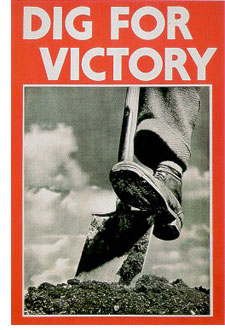 It's probably fair to say that residents of Bishop's Stortford had little idea of what to expect on their home turf when war was declared, although the distribution of 39 million gas masks throughout Britain at the start of September to every man, woman and child made it quite clear that bombing by German aircraft would be the greatest threat. Whether or not this would involve chemical warfare was unknown, so everybody was required to carry their gas mask in its cardboard box strung over their shoulder wherever they went. This included visits to the cinema, because without it admission was refused. It's probably fair to say that residents of Bishop's Stortford had little idea of what to expect on their home turf when war was declared, although the distribution of 39 million gas masks throughout Britain at the start of September to every man, woman and child made it quite clear that bombing by German aircraft would be the greatest threat. Whether or not this would involve chemical warfare was unknown, so everybody was required to carry their gas mask in its cardboard box strung over their shoulder wherever they went. This included visits to the cinema, because without it admission was refused.
The day to day work and administration of local government was put aside for the more pressing duties of organising civil defence and safeguarding life and property, and in Stortford the arrival of British military units added to the burden of billeting officers still trying to cope with evacuees. The only decrease in the town’s population was of young men aged 20 – 22, who had received their call-up papers. Many of those in exempt occupations, or too old or too young to join the armed forces, later volunteered for Air Raid Precaution (ARP) or as Local Defence Volunteers (LDV).
One and a half million *Anderson shelters had been distributed nationwide by 3 September, the huge task of supplying the public still continuing. Shelters were given free to people earning less than £250 per annum, but anyone earning more had to pay £7 for one.
*In late 1938 Sir John Anderson, a former civil servant was appointed Lord Privy Seal with special responsibility for 'Air Raid Precaution'. He asked two designers to design a cheap domestic shelter.
The biggest priority for Britain's survival at this stage was the supply of food, already dangerously low because imports had been seriously reduced by enemy action – some 20 merchant ships lost during the first two weeks of war. To avert the situation worsening, in October the Ministry of Agriculture launched its 'Dig For Victory' campaign, publicised by distributing over ten million instructional leaflets and using prominent adverts in all newspapers and magazines.
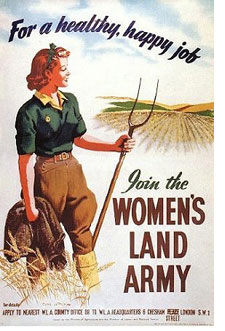 Farmers were encouraged (with a grant of £2 per acre) to plough up as much land as possible for a greater yield – 'thereby releasing ships to carry more guns and planes' – while the general public were urged to turn their gardens and any spare ground into allotments. The suggestion that lawns should also be dug up to grow crops led some Stortford residents (obviously with prized lawns) to question their obligation to do so. In the end it was left to their discretion but Bishop's Stortford UDC set an example by allowing future use of the flower beds in Castle Gardens for the growing of tomatoes – so long as the crop was then sold. At Bishop’s Stortford Golf Club, four of the course’s eighteen holes were also given over to the plough. Members continued to play the fourteen-hole course until 1953 when eighteen holes were reinstated. Farmers were encouraged (with a grant of £2 per acre) to plough up as much land as possible for a greater yield – 'thereby releasing ships to carry more guns and planes' – while the general public were urged to turn their gardens and any spare ground into allotments. The suggestion that lawns should also be dug up to grow crops led some Stortford residents (obviously with prized lawns) to question their obligation to do so. In the end it was left to their discretion but Bishop's Stortford UDC set an example by allowing future use of the flower beds in Castle Gardens for the growing of tomatoes – so long as the crop was then sold. At Bishop’s Stortford Golf Club, four of the course’s eighteen holes were also given over to the plough. Members continued to play the fourteen-hole course until 1953 when eighteen holes were reinstated.
Yet despite all the preparations for war and fear of imminent bombing, nothing much happened. German bombers did try to destroy war ships at the Royal Naval dockyard at Rosyth in Scotland on 16 October, resulting in many naval personnel being killed. And at sea military action involving naval and merchant shipping had begun almost immediately war was declared. But on the Home Front and in Western Europe most people went about their business as usual and countless evacuees returned to their own homes. The 'peace' prompted much comment from both the national and local press – this from a November issue of the H&E Observer: 'It is evident that local people are failing to treat war with Nazi Germany, seriously. Little happens every day that passes.'
Churchill called this long period of inactivity the 'Twilight War' and some called it the Bore War. Later it became universally known as the Phoney War, a phrase in fact borrowed from America. Behind the scenes, though, the British and French governments were desperately trying to find political solutions to prevent the spread of war westwards, at the same time reinforcing positions in Northern France with land and air forces. This was the British Expeditionary Force (BEF) and Advanced Air Striking Force, a deployment of forces that took place in the first five weeks of war comprising 158,000 men and 25,000 vehicles that included tanks.
Phoney war or not, preparations for a ‘real’ war continued at home and by November Bishop's Stortford had nearly 200 air raid wardens including 10 women. Only 8 of this total number were paid a weekly wage. To accommodate their duties, eight ARP headquarter posts – cement-walled buildings – were constructed at various points in the town. These were at Rye Street, Stansted Road, Dunmow Road, Hallingbury Road, Windhill, Rhodes Avenue, Scott Road and at the junction of Portland Road and New Town Road. Another post, for some reason not attached to headquarters posts, served Causeway and Hockerill Street.
In Germany, had an attempt to assassinate Hitler on 8 November been successful then the war may well have been over in a matter of weeks or months. To the dismay of the civilized world he escaped unharmed.
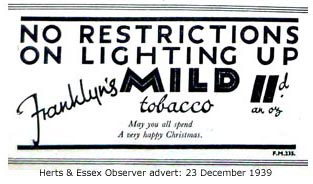 On 18 December the first Canadian troops to arrive in Britain were greeted by familiar weather – snow and freezing condition. On 18 December the first Canadian troops to arrive in Britain were greeted by familiar weather – snow and freezing condition.
December issues of the H&E Observer carried all the usual adverts for Christmas gift ideas and tips on cooking the ‘perfect’ Christmas turkey, plus a cheery little feature entitled 'How to Deal With Fire Bombs'. News stories told of a halfpenny increase in petrol, pushing the price up to 1s. 10d. per gallon – the highest it had been since February 1924 when it was 1s. 11d – and the sad story of a suicide at the Match factory in Hockerill where the storekeeper had cut a gas pipe and gassed himself. Two early morning workers who found an office door locked and the keyhole blocked, struck matches to see what the blockage was. Unfortunately, the fourth match they struck ignited the still escaping gas causing an explosion that lifted the storehouse roof and badly injured the two men.
The H&E Observer wished its readers a Happy Christmas and, all things considered, for most people it probably was. In its last edition of 1939 the paper’s editorial was optimistic for the coming year:
'Hope springs eternal despite the inconveniences, anxieties and worry of war, we shall win through in the end. For..
Right is right since God is God
And Right the day must win.
To doubt would be disloyalty
To falter would be sin.'
The editorial ended by telling people to 'keep a stiff upper lip and face 1940 with a brave heart.'
|
